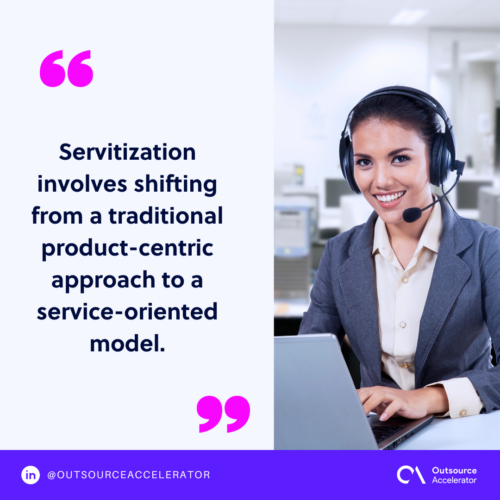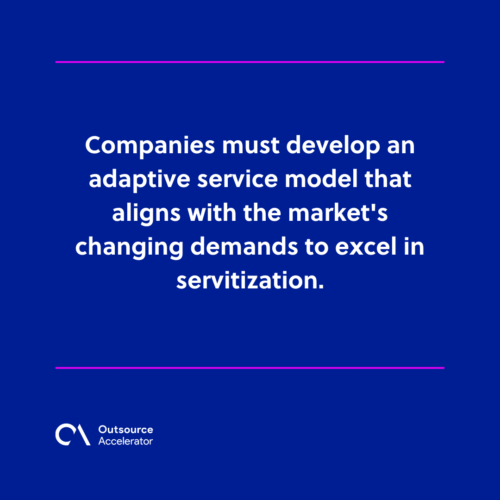Unlocking sustainable growth through servitization

As time flies, customer interactions and service continue to change. Interactions once occurring in phone calls and in stores are now replicated – and expected to excel – online.
Along with this change is the increasing transformation of one-off products into service-based items. Servitization is a model that shifts the focus from selling products to providing value-added services alongside specific products.
More than a buzzword, it is a powerful strategy that empowers companies to adapt to the changing needs of their customers.
This article explores the concept of servitization, its different levels, and how companies can enable this transformative business model to unlock sustainable growth.
Defining servitization
Servitization involves shifting from a traditional product-centric approach to a service-oriented model.
Instead of simply selling one-off products, companies usually offer additional services and features accessed with a subscription. This converts products to as-a-service models, which can be cheaper and more efficient for the company and its customers.
Servitization is a transformative business strategy that has gained significant attention in recent years. Media streaming is the most popular example of this model, with sites like Netflix and Spotify taking the lead.

Embodiments of servitization in various industries
Servitization is not limited to digital media or the tech industry. It has been successfully implemented across various domains, revolutionizing how businesses operate and deliver value.
Here are other examples of how servitization has transformed different industries.
- Manufacturing. Traditional manufacturers are now providing comprehensive solutions rather than just selling products. They offer maintenance, repairs, and upgrades, ensuring the optimal performance and longevity of the equipment they provide.
- Banking. At the same time, banking institutions allow application programming interfaces (APIs) to offer seamless experiences with the help of web systems and FinTech apps.
- Automotive. Car manufacturers embrace servitization by providing vehicles and value-added services such as maintenance, roadside assistance, and connected car features.
Servitization levels
Servitization is not a one-size-fits-all concept. It encompasses different levels, each representing a deeper integration of services into the core business model.
Let’s explore the three levels of servitization.
Product provision
At the basic level, companies focus on providing high-quality products to their customers.
This includes delivering reliable and technologically advanced offerings that meet the specific needs and demands of the market.
In today’s competitive landscape, product provision alone may not be sufficient to stand out from the crowd. This is since many firms nowadays pump out products at a breakneck rate, saturating the market.
After sales servicing
The next level of servitization involves offering after sales services to ensure continued product performance. This includes maintenance, repairs, spare parts availability, and customer support.
After sales services strengthen the company’s and its customers’ relationship, fostering trust and loyalty.
Advanced services
The highest level of servitization involves providing advanced services beyond product delivery and support.
This includes offering tailored solutions, predictive maintenance, data analytics, and performance optimization.
Advanced services enable companies to position themselves as strategic partners for their clients. Here, they can actively contribute to their customers’ success and address their evolving needs.
How companies can enable servitization
Companies must implement certain strategies and adopt specific approaches to embrace servitization successfully.
Here are three key factors that help companies enable servitization.
Smart products
Integrating smart technologies into products can significantly enhance their value proposition.
Companies can collect data from their products, analyze them, and offer valuable insights to customers to form more personalized services.
Smart products enable proactive maintenance, real-time monitoring, and improved operational efficiency. YouTube Music’s “algotorial” (algorithm and editorial) practice is an example of this, where teams only maintain the engineering of their algorithms to suit their listener’s needs.
Functional equipment
In applying servitization, companies must develop tools and equipment that is durable, efficient, flexible, and adaptable to changing customer requirements.
Functional equipment allows companies to customize their offerings and provide modular solutions that can be easily upgraded or reconfigured. These tools can be either physical or digital, depending on their market.
Adaptive service model
Companies must develop an adaptive service model that aligns with the market’s changing demands to excel in servitization.
This includes staying agile and responsive to customer feedback, continually improving service quality, and exploring innovative service offerings.
Adobe[1] is a good example of this. They are one of the successful companies that changed its structure from selling one-off tools in a box to offering a monthly subscription for their software.

An adaptive service model ensures that companies deliver value throughout the entire customer journey.
Servitization as your product selling strategy
Servitization is not just a trend; it’s a strategic approach that can drive sustainable growth and competitive advantage. By embracing servitization, companies can unlock a multitude of benefits:
- Enhanced customer value. Companies can deliver comprehensive solutions that meet customer needs more effectively by offering a combination of products and services.
- Long-term relationships. Servitization enables companies to establish long-term customer partnerships, fostering loyalty and repeat business.
- Revenue diversification. Introducing services alongside products can create new revenue streams and reduce dependence on product sales alone.
As customer expectations evolve, servitization will become even more prevalent across industries. Combining products and services will provide a competitive edge, allowing companies to deliver exceptional value and create meaningful customer experiences.
Servitization holds immense potential for businesses across industries. By embracing this transformative strategy, companies can unlock sustainable growth and position themselves as leaders in their respective markets.







 Independent
Independent




